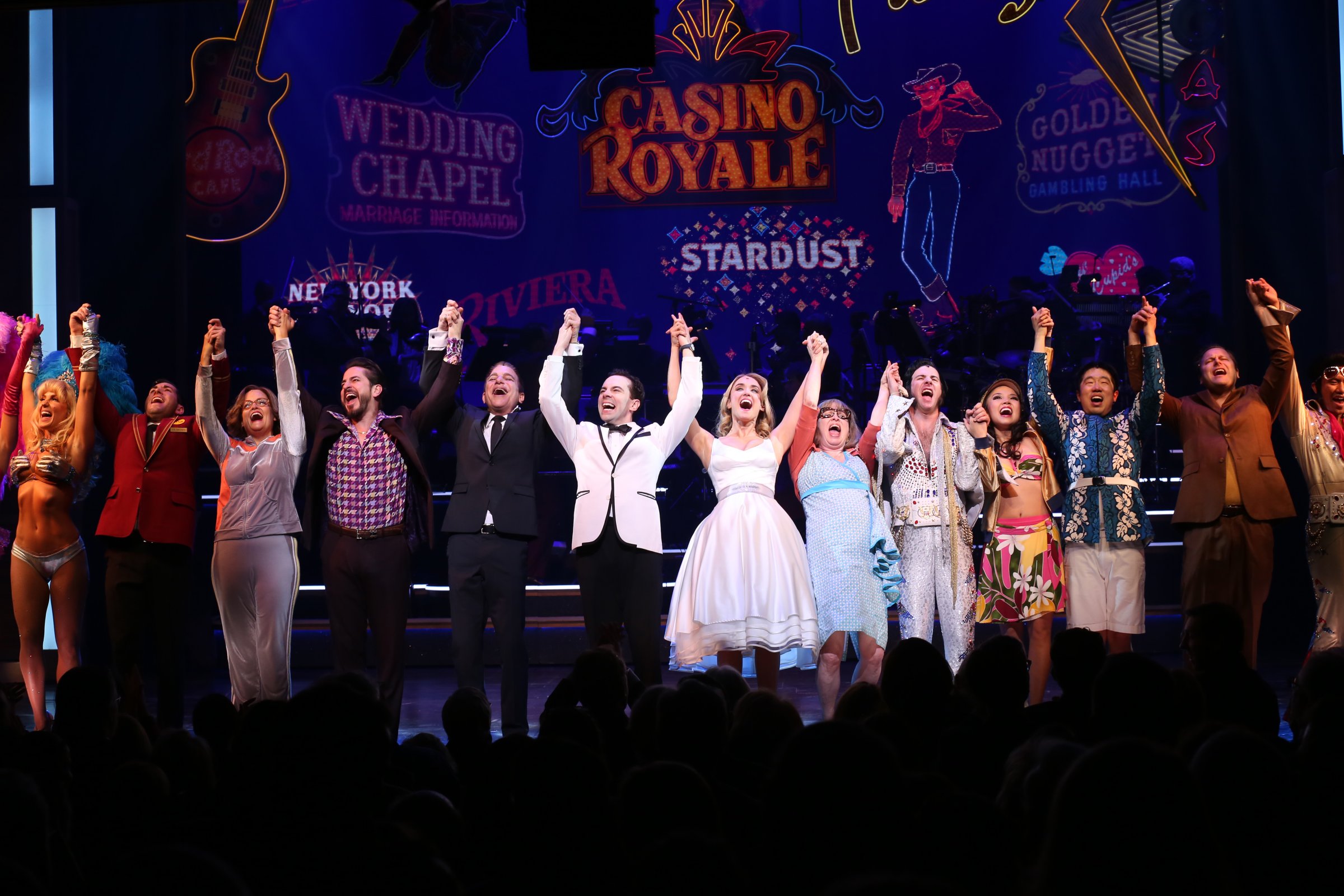
“Opening in January.” They’re the three most depressing words in movies — a telltale sign that the lame action film or Jennifer Lopez thriller you’re being touted is a sorry leftover, dumped by the studio in the fallow month following the big holiday releases. It’s not much different on Broadway, where big shows tend to close, not open, during the most low-trafficked month of the year. Two recent openings, however, are making this January a happy exception.
Honeymoon in Vegas, a long-aborning musical that opened last night at the Nederlander Theater, is based on the 1992 Andrew Bergman movie about a marriage-phobic guy who takes his fiancee to Vegas to tie the knot, only to see her fall into the clutches of a lovelorn gambler. With a book by Bergman himself and songs by the prolific Jason Robert Brown, it makes the screen-to-stage transition better than a lot of recent musicals (like last season’s Bridges of Madison County, which Brown also scored). The show is splashy and fun, and I’m betting it’s a hit.
Fans of the movie, it must be said, will notice a few deficiencies. As the nervous bachelor Jack Singer, Rob McClure (so wonderful in the title role of the musical Chaplin) settles for generic Broadway spunk, a far cry from the frantic angst that Nicolas Cage brought to the movie role. And the show’s biggest star, Tony Danza, is just a TV-bland smoothie as the gambler, with none of James Caan’s intriguing mix of menace and vulnerability on the big screen.
But hey, this is a Broadway musical, where production ingenuity, not character subtlety, is the coin of the realm. And by that measure, Honeymoon in Vegas is in the chips.
The story, for one thing, has more heft and coherence than most musical-comedies. Jack’s resistance to marriage stems from a promise to his dying mother (Nancy Opel), who pops up throughout the show, amusingly, as a nagging dybbuk. Then, just when Jack is about to break the curse and get Betsy (Brynn O’Malley) into a Vegas wedding chapel, he loses $58,000 in a poker game to the gambler — who offers to forgive the debt in exchange for a weekend with the girlfriend.
Director Gary Griffin (Broadway’s The Color Purple) takes all this seriously enough that the slick, Vegas-style production numbers don’t render the moral dilemma meaningless. Brown, one of the new generation of theatrical songwriters indebted to Stephen Sondheim, here seems to be channeling Jerry Herman instead, with bright, listener-friendly tunes full of big-band sizzle and lounge-show steam.
And then there are the flying Elvises. In the film’s most famous scene, Jack hitches a ride back to Vegas with a band of skydiving Elvis impersonators and parachute-jumps to Betsy’s rescue. The pompadoured Elvii — dressed in gold spangled leisure suits, grunting in unison — are a real hoot, and the skydiving sequence is done with such witty, low-tech stagecraft that it instantly earns a spot (along with “The Telephone Hour” from Bye Bye Birdie, and Susan Stroman’s walker-tapping grannies in The Producers) on my list of Broadway’s great comic production numbers.
Nothing could be further from the splashy Honeymoon in Vegas than the spare, mystical, two-character play Constellations, which also opened this week in a Manhattan Theater Club production. But if the first is an affirmation of the pleasures of old-fashioned Broadway professionalism, the second is heartening proof that Broadway can still, occasionally, find a place for serious and challenging new work, too.
Nick Payne’s one-act play, first produced at London’s Royal Court Theatre, is the chronicle of a couple’s life together, told in brief, time-jumbled scenes that recount the key moments of their relationship, from their first meeting (at a rain-soaked barbecue) through various crises, reconciliations and turning points. The gimmick (and I mean that in the nicest way) is that each scene is replayed several times, often in short, repetitive snippets, representing various alternate scenarios. A first night at Marianne’s apartment, for example, ends abruptly (“I’m not asking you to understand, I’m asking you to leave”), then warily, then tenderly, depending on each new iteration of the dialogue and tone of voice.
The point, we are told a little more explicitly than you might expect, lies in Marianne’s work as a theoretical physicist. She expounds on something called the “quantum multiverse,” where “every choice, every decision you’ve ever and never made exists in an unimaginably vast ensemble of parallel universes.” Scientifically speaking, there’s probably less here than meets the eye, but it’s a neat artistic construct to bring home the randomness of life, the way our personal histories can turn on the thinnest of dimes.
It wouldn’t work, however, without the exacting direction of Michael Longhurst (who directed the original London production). Each scene and time change is signaled with a quick change of lighting and a Law and Order-style sound burst. Just as important is the fine-grained acting by Jake Gillenhaal (doing an acceptable British accent) and Ruth Wilson (doing her real one), who register each emotional shift with precision and feeling.
I could have done without one major plot turn — a health crisis — that takes the play in a more conventional (if undeniably affecting) direction. Yet Payne sustains his conceit to the end, and manages to complete a theatrical high-wire act with breathtaking skill. Even the flying Elvises would be impressed.
More Must-Reads from TIME
- Donald Trump Is TIME's 2024 Person of the Year
- Why We Chose Trump as Person of the Year
- Is Intermittent Fasting Good or Bad for You?
- The 100 Must-Read Books of 2024
- The 20 Best Christmas TV Episodes
- Column: If Optimism Feels Ridiculous Now, Try Hope
- The Future of Climate Action Is Trade Policy
- Merle Bombardieri Is Helping People Make the Baby Decision
Contact us at letters@time.com